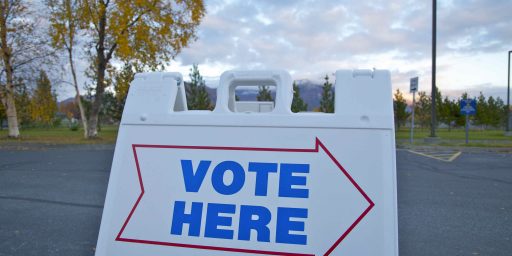Universal Childhood Suffrage
Pascal-Emmanuel Gobry argues for abolishing the minimum voting age and letting kids vote “when they decide they want the vote.” Matt Yglesias seconds the emotion.
Gobry’s argument is long and largely defies excerpting. It boils down to:
- Setting maturity at 18 is arbitrary.
- Kids will grow up and face the consequences of current policy decisions, so should have some say over them.
- It would diminish the ability of the elderly to succeed in rent seeking behavior.
- Any argument that justifies denying the vote to children could be applied to some class of people that is now allowed to vote.
These things are all true. But, really, this argument just illustrates reductio ad absurdum.
We have a representative democracy and believe that those who will have to pay for and abide by government policies should elect those who make said policies. We also believe that those who are voting should be educated, have a stake in society, and be mentally competent to make decisions.
These goals are, however, not fully mutually achievable.
We don’t want people who are seriously insane or otherwise truly incapable of understanding what they are doing to vote even though they are nonetheless subject to the laws of society; then again, we also limit their criminal liability. As a practical matter, though, there are few enough of these people that we can decide on a case-by-case basis.
Similarly, it would be absurd to allow infants to vote. They obviously can’t communicate their ideas in a manner comprehensible to us and they have limited ability to process information. How about a 5-year-old? They can walk and talk. But so few of them have even the slightest understanding of the workaday world that it would be silly to give them the vote. At best, they’d just reinforce their parents’ choice. And, as with mentally incompetent adults, they have far less culpability under our law. They can’t sign contracts and are seldom held accountable by the state for their actions.
But, of course, we can find individual 8-year-olds who are smarter and more mature than some 18-year-olds. And, certainly, nothing magically transforms a person who is 17 years, 364 days old into a responsible human being the next day.
So, 18 is arbitrary, right? Well, no. It’s an age where we expect most people to have the requisite maturity to be responsible enough to make certain decisions. They can sign contracts and be held accountable for them. They can join the military. They can get full-time jobs. The burden is on them to demonstrate that they’re not mentally competent to be responsible for violation of the criminal code.
Could we maybe lower the age to 16? Or 15? Maybe. Certainly, I was very interested in politics and had decided preferences that I could articulate as a 14-year-old. But, frankly, most people at that age aren’t paying attention. And, while that’s true of many adults, few 15-year-olds are paying taxes or otherwise contributing to society.
The last consideration, incidentally, is something that no one has mentioned in the comment sections of Gobry’s or Yglesias’ posts, despite some pretty interesting discussions taking place there. One of the fundamental ideas of our Republic is that the right to participate in government flows from the duty to fund it. “No taxation without representation” was one of the rallying cries of our war for independence. The two were always thought to be linked.
Indeed, suffrage was once restricted to landholders on the basis that only those who were paying for government had any right to have a say about it. We ultimately democratized, coming to see that disenfranchising the poor was wrong since they faced many of the burdens of citizenship, including military service. (And the passage of the income tax rendered the issue moot, regardless.) Eventually, attainment of majority was deemed enough to satisfy the “stake in society” principle. We even lowered the voting age from 21 to 18 because we came to believe that forcing people to go to war at 18 but not allowing them to have a say over whether we sent them was wrong. (Although, oddly, we’ve since decided that we can withhold their right to drink alcoholic beverages or smoke cigarettes.)
If rights and responsibility are linked, then the voting age must also be the age of accountability. If you’re mature enough to vote, you’re mature enough to be liable for you conduct. Consideration of lowering the voting age should be made with that in mind.





Robert Heinlein once wrote a novel that posited a society based on the premise that only those who had completed a tour of national service would be entitled to vote. The service did not need to be military, it could be administrative or civil service, and it needed to be completed in full. One could not vote while in service, only after completion of it.
I’ve always thought there was some merit in that concept.
I think you’re exactly right about the age of voting needing to match the age of legal liability…
…which argues that, in many places, it needs lowering, because in many places 17-year olds are in adult court under adult laws.
I think it rather obvious that we allow too many children to vote already!
30 years of age sounds about right to me, you should gain control of your own life before deciding the fate of those around you.
“”Similarly, it would be absurd to allow infants to vote. They obviously can’t communicate their ideas in a manner comprehensible to us and they have limited ability to process information.””
“””””””””””””””””””””””””””””””””””””””””””””””””
This sounds like over half of the candidates!!
On the positive side, at least those in high school will government issued picture IDs.
I suppose it would be gauche to ask which of the major political philosophies would benefit from lowering, or the removal of the age restriction… the strong minded, independent, ‘keep government out of my life and our pockets’ philosophy, or the ‘I need government to take care of everything’ philosophy. Obviously, younger people will lean toward the latter. I find myself amazed that someone like Gorby, who proclaims himself from the French Right, hasn’t worked that one out for himself.
That’s even assuming a total lack of fraud… which Yglesias’ readers give fine example to.
Premise: the key is paying taxes or having a stake.
conclusion: we should extend the franchise to minors.
Inconvenient fact:
adults in Washington DC, Guam, Puerto Rico, and V.I. pay taxes, are subject to our rule, and have a stake, yet those adults do not have voting rights.
The argument made to extend the vote to kids seems academic and trite — unless we first ensure full voting rights to all citizens and all adults taxed by our laws, or subject to the rule of our government.
Otherwise, the whole argument seems to be just a silly parlor game.
If you are going to link it to taxation, 16 should obviously be the age. Most of my friends and I were working by 16 and being taxed for it. Indeed, at that age, we suffered from taxation without representation. Accountability – I believe most 16 years old are responsible for traffic violations at the very least. Most states would also probably try them as adults for serious crimes.
In this country, age assumptions are often absurd. At 16, you can drive a potentially lethal vehicle, but you aren’t responsible enough to vote. At 18, you can shoot a gun, drive a tank, fly a warplane, die for your country etc, but aren’t responsible enough to buy alcohol. At 70, when many peoples faculties are greatly diminished, they still assume you are competent to drive. No testing required.
Bithead:
The likelihood is that it would less be a function of furthering a specific ideology as would simply be a means of amplifying the vote of the parent(s).
They have voting rights in all those places. They’re not states, so they don’t have voting reps in the House and Senate. (They do, however, have non-voting representatives.) But they vote.
They vote for their chief executive and legislative representatives and probably judges as well. DC residents even vote for president.
(heh)
Clearly, you didn’t grow up in the 60’s.
Let’s just say that’s not been my own observation.
When I saw the link to this article I thought it was a gag. Who are these two morons? Or is Obama already planning his reelection strategy on the theory that his current youth base will have caught on to him by 2012? If so someone please remind him he needs to get elected before he can be reelected.
There’s actually some pretty decent science supporting the idea that the brain doesn’t mature until roughly the 20’s.
Unfortunately, we abandoned all of those ideas formally about 40 years ago. Now the conditions for voting are strictly arbitrary.
I think there’s a serious question lurking behind this idiotic one: who should be allowed to vote and why? If we limit voting to net shareowners, that would limit the franchise indeed. If we extend it to all stakeholders, why limit the franchise to naturalized Americans and those American born?
My view: the voting age should be raised to 25, naturalized Americans and American born only. A literacy test would be good, too, if such a thing could be administered in a way that wasn’t racially biased.
FWIW I filed my first tax return when I was 14 and have been paying taxes since then.